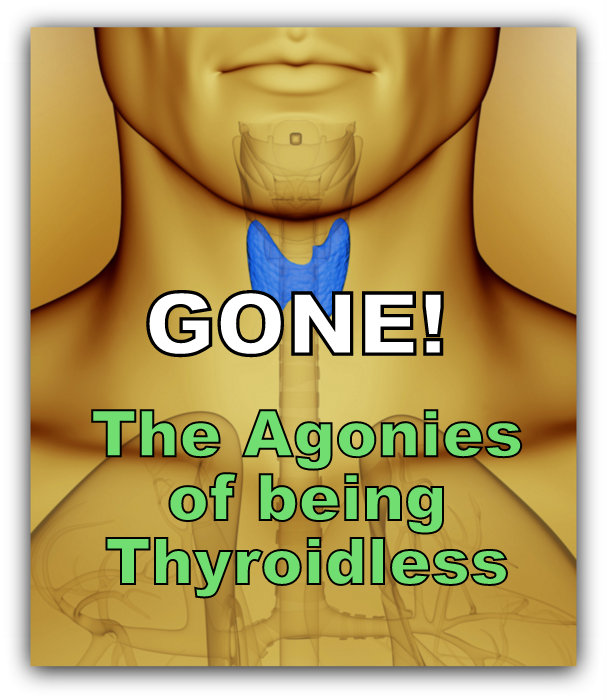Confessions of an Undercover Thyroid Advocate
The following guest blog post is written by Amy McMullen, who had undiagnosed & symptomatic hypothyroidism for 20 years due to the sole use of the TSH, resulting in multiple health problems. She is now treating per the guidelines on STTM including T3 for thyroid hormone resistance, adrenal support, and desiccated thyroid.
I found her story below as an undercover advocate fascinating, and think Amy is caring and committed, in spite of severe restrictions! Bless you, Amy.
I spend an inordinate amount of time these days contributing to a well-known online thyroid disorders forum I’ll call “Thyroid Health Forum” (not its real name).
It’s a tricky forum with draconian rules: they don’t allow you to post any links to resources, talk about where you get your online labs done, include quotes from studies, or post any names of thyroid advocates. You can’t use a username you’ve used on any other forums and you can’t mention using their personal messaging system.
I’ve received a few “infractions” from the ever-vigilant board “administrators” and “moderators” (never could color inside the lines, I guess) and have been warned to never, under any circumstances, use the words “Stop the Thyroid Madness” or any references to this website or book in my posts.
At more than one point I was ready to walk away and just give up on it. How can you share your experiences when there were so many rules that seemed designed to inhibit a free flow of information, to the point of not being allowed to mention the title of a good book by name or type in the word Google?
But I would read the following posts submitted by desperate people and this would keep me coming back to try, somehow, to help:
- “Hi, my doctor says my labs are all normal but I’ve got so many symptoms, I can hardly function…”
- “My doctor says that free T3 and free T4 testing is not useful, that my TSH is normal and that unless my TSH is high he won’t order any antibody tests…”
- “My doctor says that my TSH is too low and wants me to cut back on my thyroid hormones, but I know I will start feeling bad if I do this… Help!”
- “I am taking Synthroid but I feel terrible and my hair is falling out and now my doc wants me to take an antidepressant…”
You see, I was in this very same boat for far too many years. About 20 years back I started noticing symptoms:Â fatigue, depression, menstrual irregularities, and dizzy spells. I went to see my doc who did the usual TSH test and when it came back “normal”, prescribed antidepressants. The antidepressants did help, but my menstrual problems intensified and other symptoms increased until I finally underwent a hysterectomy for dysfunctional uterine bleeding. Shortly thereafter, I collapsed with heart irregularities and autonomic nervous system dysfunction in the fall of 2006.
I went to over 10 different specialists spending thousands of dollars for medical bills with no real answers–just a lot of shrugged shoulders and a fibromyalgia diagnosis.
It wasn’t until my mother was hospitalized and routine blood testing came back with a TSH of over 6 that I looked again at my own thyroid. My TSH was never above 3. I had one free T4 test done following my initial collapse but, again, all tests were flagged “normal” and thyroid was passed over once again.
But a search about TSH lab ranges led me to Mary Shomon’s About.com articles, and while she seemed to be stuck on the idea that 3 was an acceptable number for the top of range for TSH, based entirely on the American Association of Clinical Endocrinologists recommendations, I finally found the Stop the Thyroid Madness site and learned otherwise.
It was here that I learned about other testing like free T3, free T4, thyroid antibodies, vitamin and ferritin levels and, very importantly, that the TSH should be the LAST test done for diagnosing hypothyroidism instead of the ONLY test. I finally caught on to how the medical establishment has failed miserably to adequately diagnose and treat hypothyroidism. I felt both incredibly empowered and very, very angry.
I quickly delved into the thyroid forums to share what I’d learned and to learn from others. The first forum I found was the aforementioned “Thyroid Health Forum”, and since this is one of the best-known, it is where many of the newbies, like me, find themselves. There were both natural and synthetic hormone proponents on the board and the advice ranged from very good to quite bad. I soon found there were better forums like Realthyroidhelp and the natural thyroid hormone Yahoo groups that had really smart people who were happy to share resources and information that was truly useful. I spent a lot of time on these and learned a great deal.
But for some reason I couldn’t seem to leave the “Thyroid Health Forum”. The people who stumbled on there seemed so lost and I felt compelled to impart what I had learned to them. I would offer alternatives to the synthetics and explain why natural desiccated thyroid (NDT) was a superior treatment option and, more importantly, that they did have an option for their treatment, despite what their doctor told them. I’d relay what I had learned from other boards about access to NDT during the shortages.
When I figured out I had adrenal fatigue and later thyroid hormone resistance as a result of being undiagnosed for so long, I started relaying information about these issues to the many who were having difficulties getting optimized on their hormone replacement therapy. I found it to be both rewarding and enormously educating for myself as I would spend time researching questions that were asked about supplements, lab tests, and studies. I was not allowed to post links so had to summarize things I had learned and this taught me even more. The main messages I pushed were (and are):Â get the right labs done, learn how to interpret them correctly, be your own advocate, know your treatment options, and don’t implicitly trust doctors.
I will continue to contribute what I’ve learned to the “Thyroid Health Forum”. So far I’ve managed to fly under the radar and play, however grudgingly, by their rules. I figure if I can get just one or two people to question the present thyroid clinical guidelines, as written by our friends at big pharma, I’ll be more than satisfied. I actually believe that by getting good information out there to as many sufferers as possible, we may create a groundswell of people who will no longer accept being dismissed as depressed complainers by their healthcare providers. And this is one more way we can help enact real change to the currently abysmal medical practice of thyroid diagnosis and treatment. Well worth it in my book!
*******************************
Latest news from RLC: Shipments of Naturethroid are beginning Monday, January 4th and the first two weeks with backorders going out ASAP. Medco should have some by the end of January. Their Patient Information Line: Naturethroid/Westhroid: 877-600-4752
Thyroid patient guest posts can be read about here: /writing-a-guest-blog-post-on-sttm/
Want to honor someone who has helped you?? See the blog post below and thank someone.
NOTE: if you were receiving email notifications about these posts, the company doing them is out of business. Instead, use an RSS Feed.


 Though this post was originally written in 2009, the principles and information are still applicable today!
Though this post was originally written in 2009, the principles and information are still applicable today! The news this morning about Oprah made me pause.
The news this morning about Oprah made me pause.
